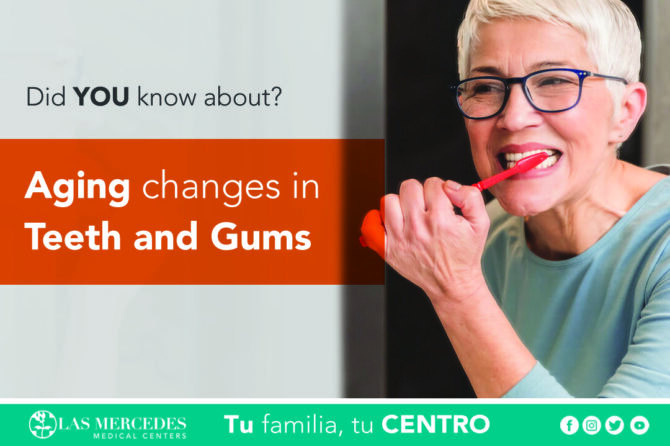
Aging Changes in Teeth and Gums
Changes from aging occur in all cells, tissues and organs of the body. These changes affect all parts of the body, including the teeth and gums.
Certain medical conditions that are more common in older adults and taking certain medications can also affect oral health.
Learn what you can do to keep your teeth and gums healthy for years to come.
How aging affects health
Certain changes occur slowly over time in our bodies as we age:
-Cells renew at a slower rate
-Tissues become thinner and less elastic
-Bones become less dense and strong
-The immune system can become weaker, so an infection can occur more quickly and healing takes longer
These changes affect the tissue and bone in the mouth, increasing the risk of oral health problems in later years.
Common Oral Health Problems in Older Adults
MOUTH DRYNESS
Older adults are at higher risk for dry mouth. This can occur due to age, medication use, or certain medical conditions.
Saliva plays an important role in maintaining oral health. Protects your teeth from cavities and helps your gums stay healthy. When the salivary glands in your mouth don’t make enough saliva, this can increase your risk for:
-Problems to taste, chew and swallow
-Mouth ulcers
-Gum disease and tooth decay
-Fungal infection in the mouth (candidiasis)
Your mouth may produce slightly less saliva as you age. But medical problems that occur in older adults are the most common causes of dry mouth:
-Many medications, such as some used for high blood pressure, high cholesterol, pain, and depression can decrease the amount of saliva you produce. This is probably the most common cause of dry mouth in older adults.
-The side effects of cancer treatment can also cause dry mouth.
-Medical conditions such as diabetes, stroke, and Sjögren’s syndrome can affect your ability to produce saliva.
PROBLEMS WITH THE GUMS
Receding gums are common in older adults. This is when the gum tissue separates from the tooth, exposing the base or root of the tooth. This facilitates the accumulation of bacteria and causes inflammation and tooth decay.
A lifetime of brushing your teeth too hard can cause your gums to retract. However, gum disease (periodontal disease) is the most common cause of receding gums.
Gingivitis is a premature type of gum disease. This occurs when plaque and tartar build up and irritate and inflame the gums. Severe gum disease is called periodontitis. This can lead to tooth loss.
Certain common conditions and diseases in older adults can put them at risk for periodontal disease.
-Don’t brush or floss every day
-Not receiving regular dental care
-Smoke
-Diabetes
-Redness of the mouth
-Weakened immune system
CAVITIES
Tooth decay occurs when bacteria in the mouth (plaque) convert sugars and starches in food into acid. This acid attacks tooth enamel and can lead to cavities.
Cavities are common in older adults in part because more adults are keeping their teeth for life. Since older adults often have receding gums, cavities are more likely to develop at the root of the tooth.
Dry mouth also causes bacteria to build up in the mouth more easily, leading to tooth decay.
ORAL CANCER
Oral cancer is more common in people over the age of 45, and it is twice as common in men as it is in women.
Smoking and other types of tobacco use are the most common cause of oral cancer. Excessive alcohol consumption along with tobacco use greatly increases the risk for oral cancer.
Other factors that can increase your risk for oral cancer include:
-Human papillomavirus (HPV) infection (the same virus that causes genital warts and many other cancers)
-Poor dental and oral hygiene
-Take medications that weaken the immune system (immunosuppressants)
Rubbing as a result of rough teeth, dentures, or fillings for a long period of time
How to protect your teeth and gums
No matter what your age is, proper dental care can keep your teeth and gums healthy.
-Brush your teeth twice a day with a soft-bristle toothbrush and fluoride toothpaste.
-Floss at least once a day.
-Go to the dentist for regular check-ups.
-Avoid sweet and sugar-sweetened beverages.
-Don’t smoke or use tobacco.
If the medications are causing a dry mouth, talk with your healthcare provider to see if you may be able to change the medications. Ask about artificial saliva or other products to help keep your mouth moist.
When to call the doctor
You should contact your dentist if you notice:
-Toothache
-Encías rojas o inflamadas
-Redness of the mouth
-Mouth ulcers
-White or red patches on the mouth
-Bad breath
-Loose teeth
-Falt-fitting dentures
From: Medlineplus.gov
Leave a reply


Leave a reply